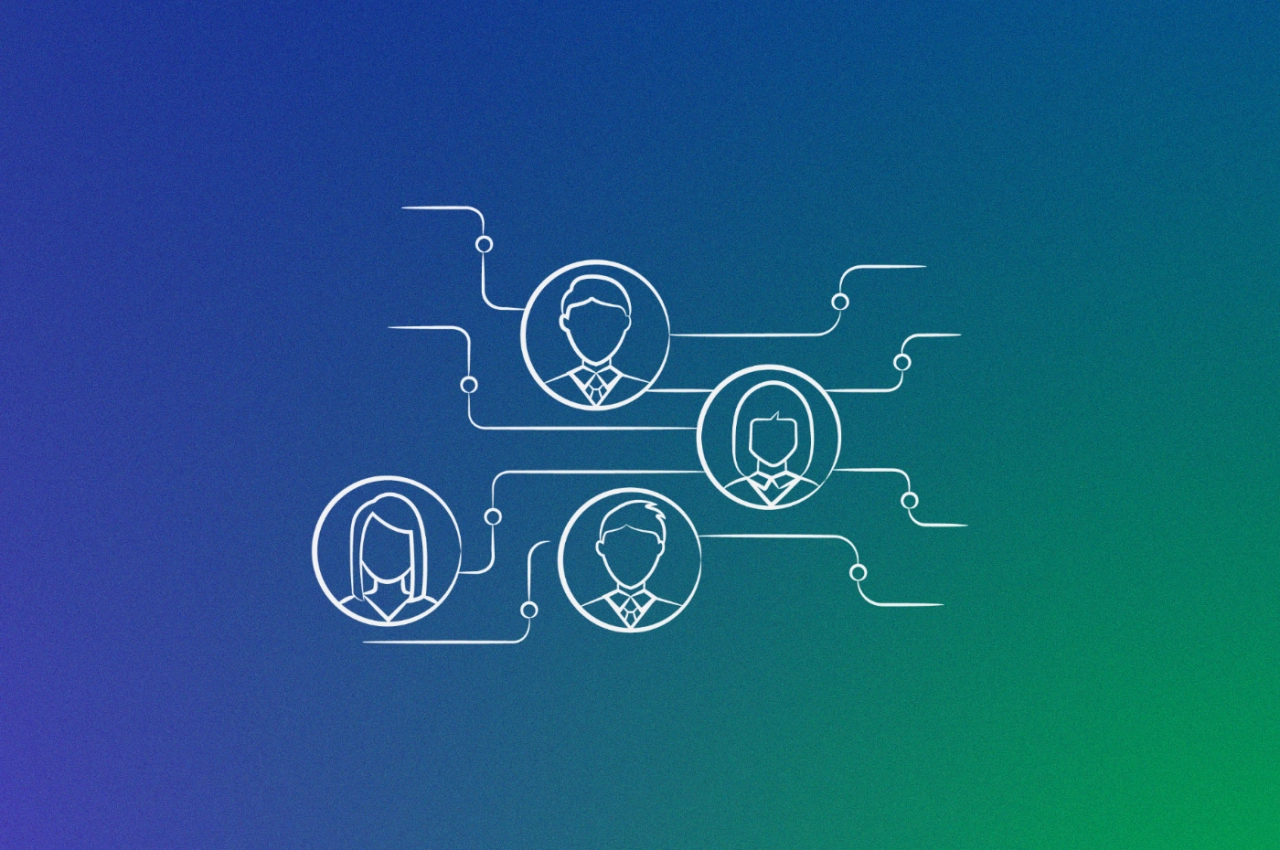Ask any agency owner, and they’ll tell you that building and maintaining strong client relationships is essential to the success of their business. After all, without happy clients, there would be no agency to speak of.
In order to scale your agency effectively, you need access to the best CRM for your needs. It will help you keep track of your clients, manage data, and automate tasks like follow-ups and appointment scheduling. In short, it makes life a lot easier for agency owners and staff.
But with so many tools on the market, how do you know which one is the best CRM for agencies? In this article, I’ll give you a framework for choosing the right CRM, as well as many recommendations to get you started.
How to choose a CRM for your agency
Choosing the right CRM isn’t just about features—it’s about finding the tool that actually fits how your agency works. Here’s a simple framework to find the best customer relationship management tool for your agency.
1. Prioritize your agency’s core needs
Start by thinking about your essential processes and which features you need to support them. For agencies, this typically includes:
Client management: Can you organize contacts by company, project, or service line?
Team collaboration: Does it support role-based access and internal communication?
Project integration: Can you connect client relationships to project work and deliverables?
Automation capabilities: Will it handle follow-ups, task assignments, and workflow automation?
Reporting: Can you generate client-facing reports and track agency KPIs?
2. Set a realistic budget
Price is the easiest way to narrow down your options. Set a budget and only consider CRMs that fit within it. Remember that most CRMs bill per user, so factor in your team growth plans. For agencies, expect to spend $15–50 per user per month for solid functionality.
3. Evaluate ease of use and scalability
Ease of use: Your team needs to actually adopt the tool. Look for intuitive interfaces and straightforward workflows. If it takes weeks to train your team, it’s probably too complex.
Scalability: As your agency grows, so will your client base and team size. Make sure the CRM can handle your growth without forcing you to switch systems later.
4. Research and create a shortlist
Read documentation, reviews, and case studies to understand how each CRM performs in real agency environments. Look specifically for reviews from agencies similar to yours in size and service offering.
Create a ranked shortlist based on the best combination of features, price, and user feedback.
5. Test with trials and demos
Most CRMs offer free trials or demos. Take advantage of these to see how they work with your actual client data and team workflows. Set up a few test clients and run through your typical processes.
Pro tip: Involve your team in the testing process. The best CRM is the one your team will actually use consistently.
Top 7 CRMs for agencies
At a glance, the best CRMs for agencies based on your needs:
Capsule: Best for small to medium agencies
Odoo: Best for agencies on a budget
SPP: Best for growing agencies
HubSpot Sales Hub: Best for large agencies
Copper: Best for Google Workspace users
Less Annoying CRM: best for small agencies on a budget
Funnel: Best for solopreneurs
1) Capsule CRM: best for medium agencies
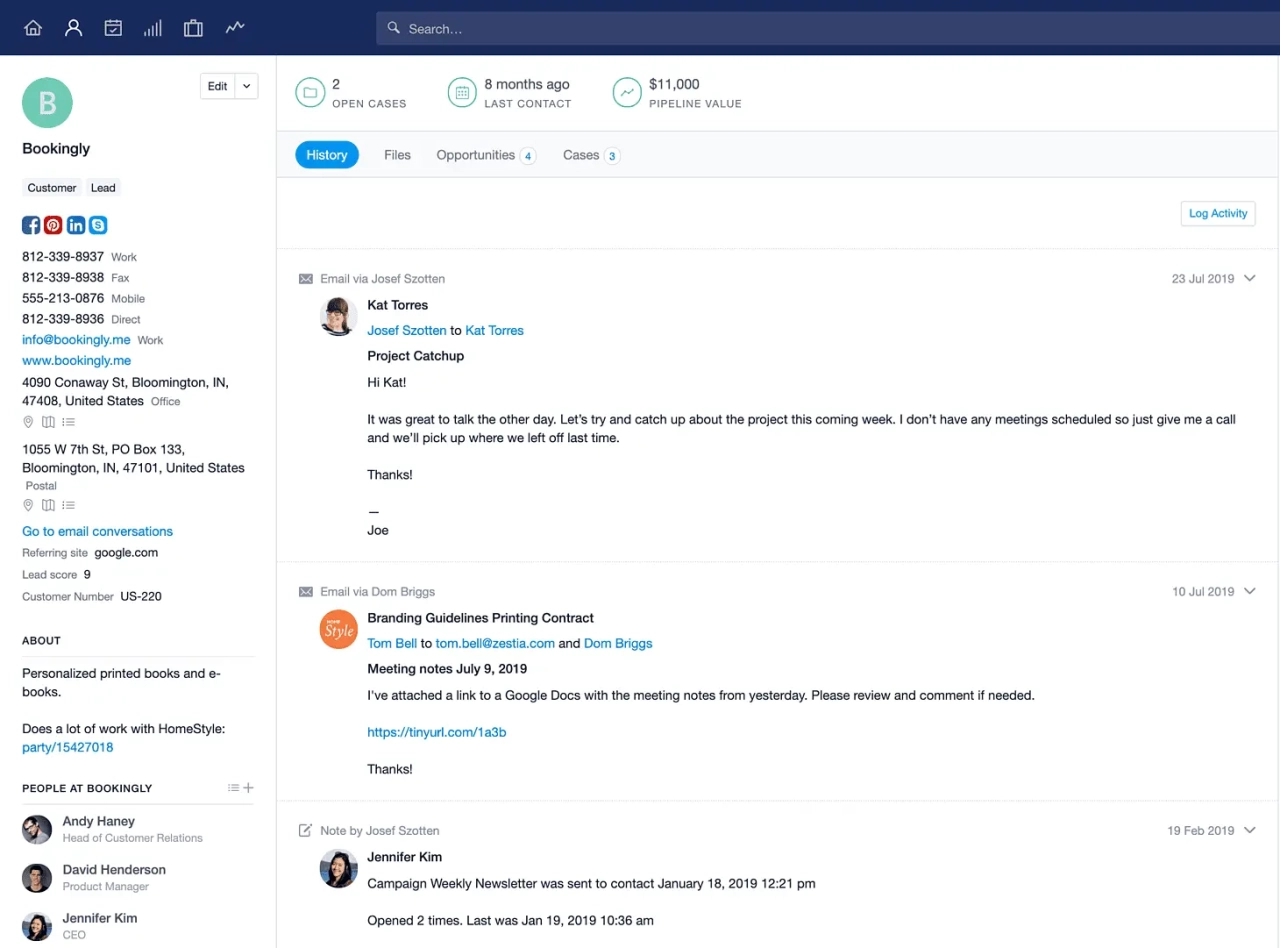
Capsule is perfect for small to medium agencies. It offers all the features you need in order to manage client relationships, including:
contact management
email templates
sales pipeline
sales analytics
Capsule doesn’t offer the automated features you’ll find with other CRMs on this list. That said, its simplicity (and the affordability that comes along with it) is a big part of why so many small to medium business owners love it.
Capsule also integrates with many popular business tools, like Google Apps, Xero, Mailchimp, and SPP via Zapier. So, if you’re looking for a simple CRM that pairs well with your SPP client portal, Capsule may be the one for you!
Pricing:
Professional: $18/user/month
Teams: $36/user/month
Enterprise: $54/user/month
2) Odoo: best for agencies on a budget
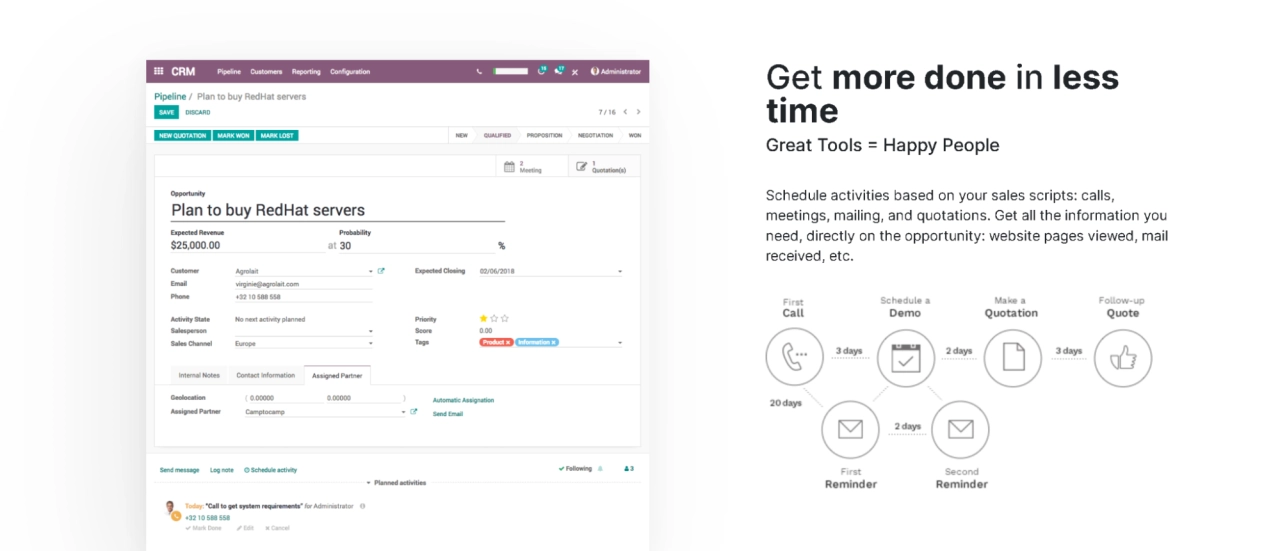
Odoo offers a unique value proposition with its free, open-source CRM that can expand into a complete business management suite. For budget-conscious agencies, it provides essential CRM functionality without monthly subscription costs.
Key features:
complete sales pipeline tracking and management
contact organization with detailed customer profiles
email integration and automated messaging capabilities
lead scoring and opportunity management
basic reporting and analytics dashboards
modular design allowing addition of business apps
mobile access and offline synchronization
Odoo’s strength lies in its modular approach: start with free CRM, then add invoicing, project management, or accounting modules as needs grow. The open-source nature allows extensive customization for agencies with technical resources.
Ideal for: Budget-conscious agencies starting their CRM journey, teams comfortable with technical setup requirements, and businesses planning to eventually need comprehensive ERP functionality beyond just CRM.
Limitations: The free model comes with significant caveats. While the basic CRM is free, adding essential features like invoicing requires paid modules, quickly increasing costs. The interface feels dated compared to modern alternatives, and the learning curve is steeper than user-friendly options. Technical support is limited on free plans, and customization requires programming knowledge. Setup complexity often requires dedicated IT resources.
Implementation: Expect 2–3 weeks for basic setup, longer if customizing. Technical expertise recommended for optimal configuration.
Pricing:
CRM module: Free
Additional modules start at $6/user/month each
Bottom line: True budget option with growth potential, but hidden costs and technical complexity make it less free than it appears.
3) SPP: best for growing agencies
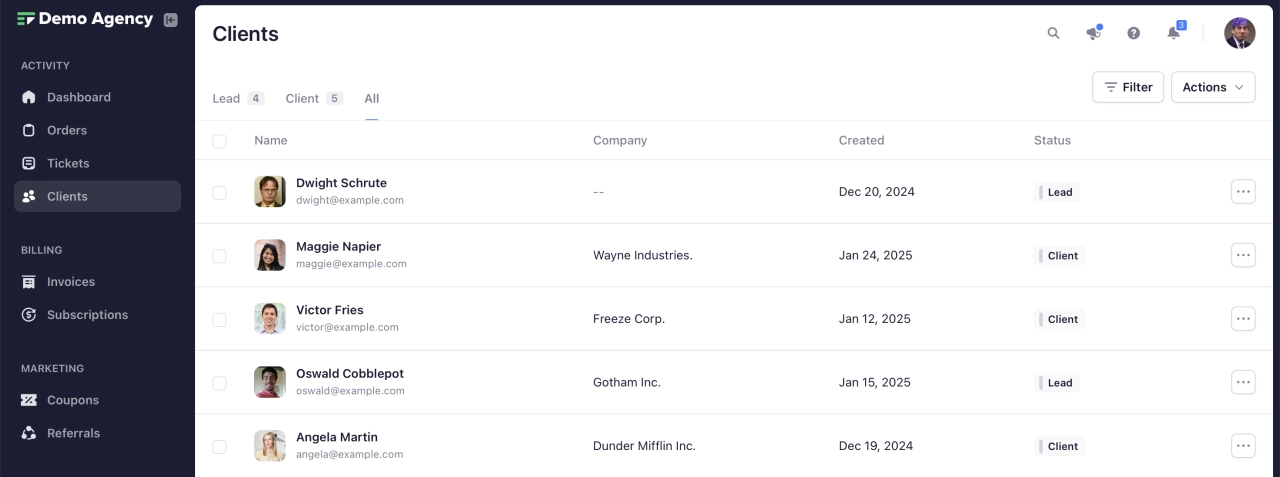
Service Provider Pro is an all-in-one agency management platform with robust CRM capabilities built specifically for service businesses. Unlike traditional CRMs, SPP integrates client relationship management with project delivery, billing, and client portals.
Key features:
unlimited client accounts with comprehensive history tracking
Zapier integration for automated profile updates
custom form assignments for different services
built-in project management and delivery tracking
integrated billing and subscription management
white-label client portals with self-service capabilities
advanced analytics and reporting across all client touchpoints
SPP excels when agencies need their CRM data to connect directly with project delivery and billing systems. All client interactions, project updates, and payment history live in one unified system.
Ideal for: Agencies with 20-50 clients that offer recurring services, teams needing integrated project delivery with CRM, and businesses ready to invest in comprehensive system setup for long-term scalability.
Limitations: SPP has a steeper learning curve than simple CRM tools, requiring 2–4 weeks for full team adoption. The comprehensive feature set can be overwhelming for agencies only needing basic contact management. At $129/month minimum, it’s significantly more expensive than basic CRM alternatives and may not justify the cost for agencies under 30 clients.
Implementation: Expect 3–4 weeks for full setup and team training. Requires dedicated admin time for optimal configuration.
Pricing:
Basic: $129/month
Pro: $299/month
Plus: $1,500/month
Bottom line: Powerful all-in-one solution for data-driven agencies, but the complexity and cost make it overkill for simple contact management needs.
4) HubSpot Sales Hub: best for large agencies
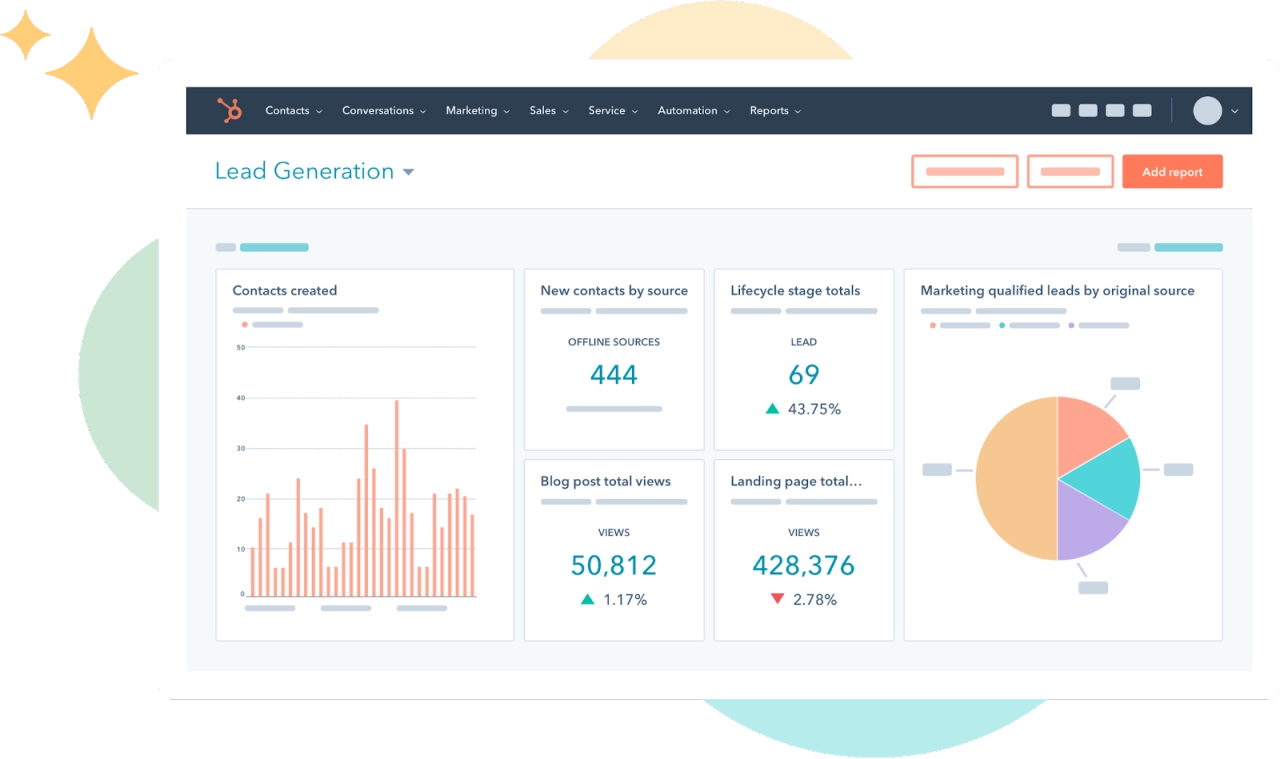
HubSpot Sales Hub is the enterprise-grade CRM solution that scales with large agencies managing complex sales processes. As one of the most established platforms in the market, it offers comprehensive functionality for sophisticated agency operations.
Key features:
advanced automated workflows and lead scoring
comprehensive email tracking and sequence automation
detailed reporting and custom dashboard creation
artificial intelligence tools for sales optimization
native integration with Marketing Hub and Service Hub
advanced pipeline management with multiple deal stages
team performance tracking and territory management
HubSpot excels at handling complex sales cycles typical of large agency new business processes. The platform can manage hundreds of prospects while automating nurture sequences and tracking engagement across multiple touchpoints.
Ideal for: Agencies with 25+ employees, complex sales processes requiring multiple stakeholders, teams already using other HubSpot products, and organizations needing sophisticated reporting and analytics.
Limitations: HubSpot’s comprehensive feature set comes with significant complexity requiring dedicated administration. The learning curve is steep, often taking 6-8 weeks for full team adoption. Pricing scales aggressively: costs can reach $1,000+ monthly for growing teams. Many agencies find themselves paying for advanced features they never use, and the platform can feel overwhelming for straightforward client relationship management.
Implementation: Plan for 4–6 weeks of setup and training. Consider hiring HubSpot specialists for optimal configuration.
Pricing:
Free: $0/month
Starter: $45/month
Professional: $450/month
Enterprise: $1,200/month
Bottom line: Industry-leading capabilities for large agencies, but the complexity and cost make it excessive for most small to medium operations.
5) Copper: best for Google Workspace users
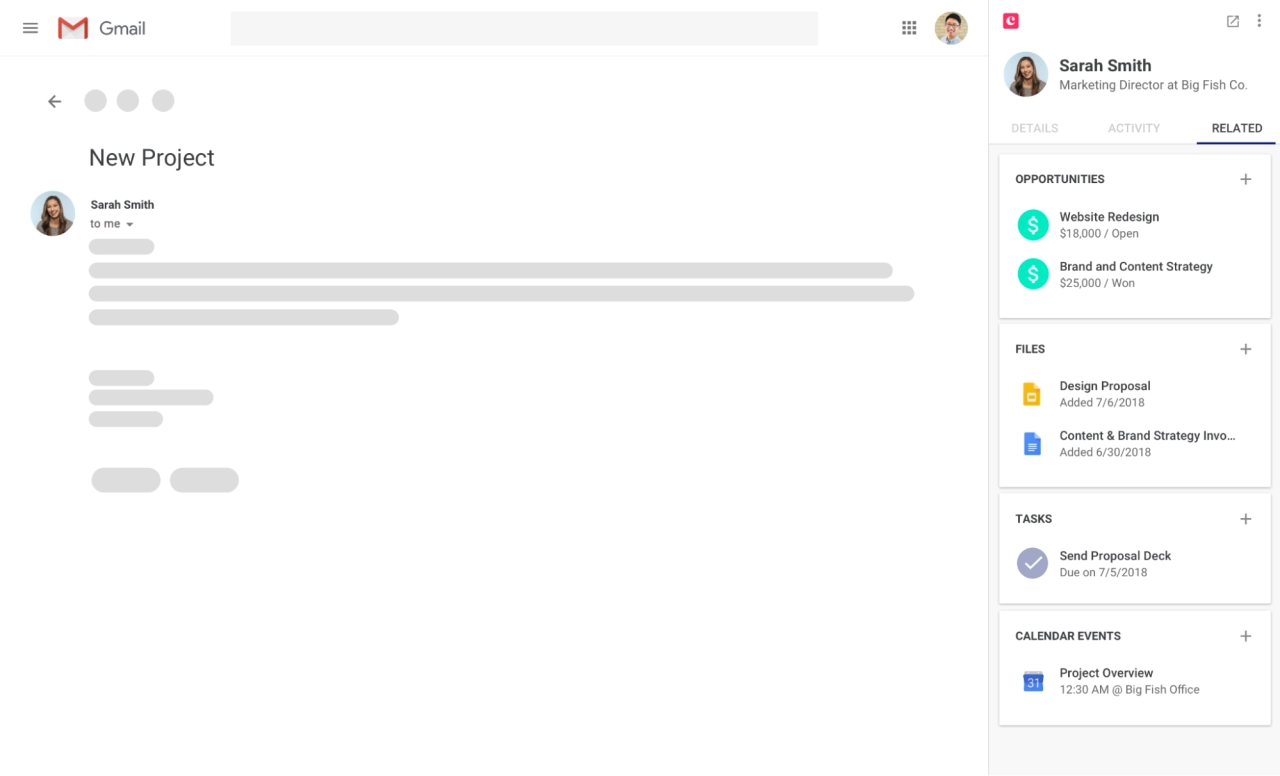
Copper is designed specifically for teams already operating within Google Workspace. Rather than replacing your existing workflows, Copper layers CRM functionality directly into Gmail, Google Calendar, and Google Drive environments.
Key features:
native Google Workspace integration requiring no additional logins
automatic contact and communication capture from Gmail
visual sales pipeline with drag-and-drop deal management
email templates and automated follow-up sequences
sales forecasting and performance analytics
mobile app with offline access capabilities
integration with Zapier, Xero, QuickBooks, and other business tools
Copper’s primary advantage is seamless adoption for Google-centric teams. Since it works within existing Google interfaces, team members can manage client relationships without learning new software or changing established workflows.
Ideal for: Agencies heavily invested in Google Workspace, teams resistant to additional software platforms, and businesses wanting CRM functionality without disrupting current email and calendar workflows.
Limitations: Copper’s Google dependency becomes a weakness for teams using mixed software environments. Reporting capabilities are limited compared to dedicated CRM platforms. The per-user pricing model becomes expensive quickly, and advanced automation features lag behind specialized competitors. If your team doesn’t primarily operate within Google tools, Copper loses much of its appeal.
Implementation: For Google Workspace users, setup takes 1–2 days with immediate team adoption. Non-Google teams may struggle with the interface.
Pricing:
Basic: $25/user/month
Professional: $59/user/month
Business: $119user/month
Bottom line: Perfect fit for Google-native agencies, but teams using diverse software ecosystems should consider more platform-agnostic alternatives.
6) Less Annoying CRM: best for small agencies on a budget
Less Annoying CRM delivers exactly what its name promises: straightforward client relationship management without overwhelming complexity or escalating costs. Designed specifically for small businesses transitioning from spreadsheets, it focuses on core functionality over feature bloat.
Key features:
simple contact management organized by company and individual
activity tracking for emails, calls, and meetings
task management with automated reminders
customizable fields for agency-specific data like project status or retainer amounts
calendar integration with meeting scheduling
basic reporting on contacts and activities
mobile app for managing relationships on-the-go
The platform excels at team adoption: most users are productive within hours, not days. The interface prioritizes clarity over advanced features, making it ideal for agencies where CRM adoption has previously failed due to complexity.
Ideal for: Small agencies with 2–10 team members, businesses transitioning from spreadsheet-based client tracking, and teams that need basic relationship management without advanced automation requirements.
Limitations: The simplicity that makes Less Annoying CRM appealing also limits its growth potential. There’s no marketing automation, limited integration options, and basic reporting capabilities. Advanced pipeline management and complex workflow automation aren't available. Agencies needing sophisticated sales processes or extensive third-party integrations will quickly outgrow the platform.
Implementation: Setup takes 1–2 hours with immediate team adoption. Most agencies are fully operational within 24 hours.
Pricing:
Single plan: $15/user/month (no setup fees, no hidden costs, no annual commitment required)
This predictable pricing makes it easy to budget as your agency team grows, without worrying about feature tiers or usage limits.
Bottom line: Perfect for agencies wanting simple, reliable contact management, but teams needing advanced CRM features should consider more comprehensive alternatives.
7) Funnel: best for solopreneurs
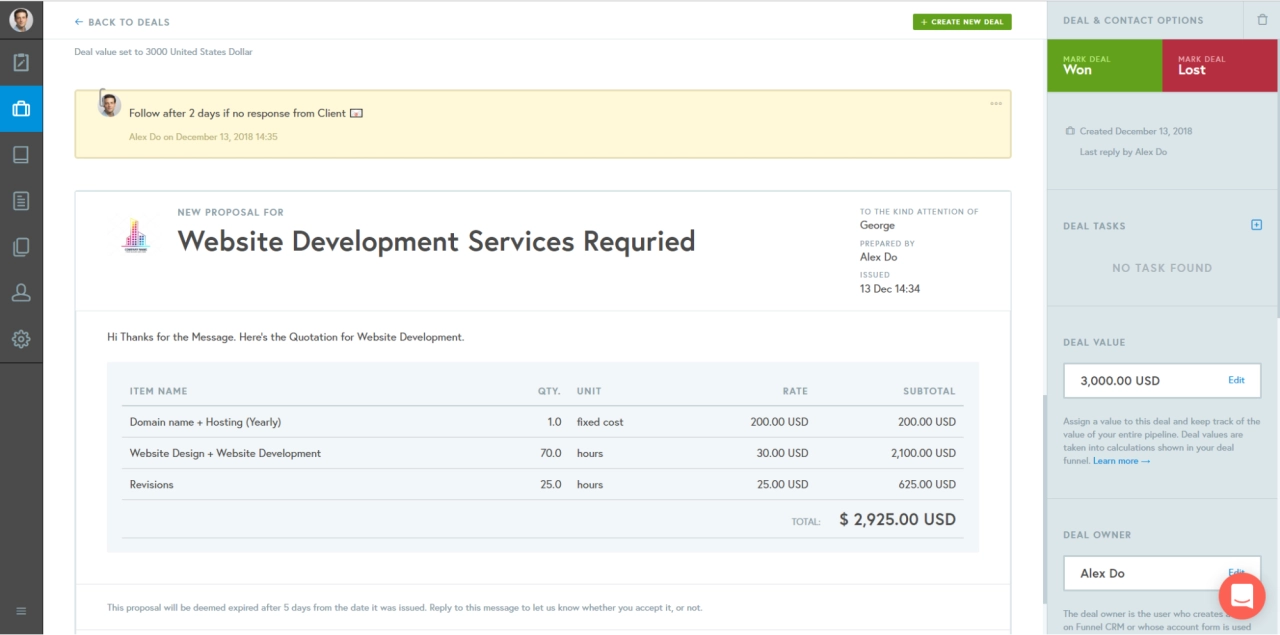
Funnel is a no-nonsense CRM designed specifically for solopreneurs who outsource most agency work but manage client relationships independently. The platform focuses on simplicity over feature complexity, making it ideal for one-person operations.
Key features:
unlimited managed contacts with clean organization
automatic tasks and reminders for follow-ups
direct email integration with Gmail and Outlook
customizable proposal and form templates
basic pipeline management and deal tracking
Funnel excels at helping small businesses graduate from spreadsheets without overwhelming them with enterprise features they don’t need. The interface is intuitive enough that you can start managing contacts within hours of setup.
Ideal for: Solo agency owners who handle 10–50 clients, freelancers transitioning from informal systems, and consultants who need basic relationship tracking without team collaboration features.
Limitations: The simplicity that makes Funnel appealing also limits its growth potential. It lacks team collaboration functionality, limited automation capabilities compared to more robust platforms, and reporting features are basic. If you plan to hire employees or need advanced workflow automation, you’ll likely outgrow Funnel quickly.
Implementation: Setup takes 1–2 hours with minimal learning curve. Most users are fully operational within their first week.
Pricing:
Standard: $10/month
Pro: $49/month
Bottom line: Perfect for solopreneurs who want simple contact management, but agencies planning to scale beyond one person should consider more robust alternatives from the start.
Find your perfect CRM
Answer a few questions to discover which CRM best matches your agency’s needs
Frequently asked questions
What is an agency CRM?
Digital agencies need a way to manage all contacts, some of which are leads ready to be turned into paying customers; others might become a paying client later. CRM software allows agencies to manage everything from client notes to deal pipelines, while organizing information by client company rather than individual contacts.
What is the best CRM for digital marketing agency?
Modern agencies rely on marketing automation, so the chosen CRM tool should have native integrations for tools such as Slack, Gmail, and more. ActiveCampaign is a solid email marketing platform & sales CRM for digital marketing agencies looking to automate their processes and close deals efficiently.
How is a CRM used in digital marketing?
A CRM platform captures and analyzes key information about contacts. For instance, with rules set up, it can score leads based on their engagement. This allows companies to focus their email marketing efforts on highly engaged leads, and educate those that are not ready to purchase yet.
Should agencies use separate tools for sales vs. client management?
Most agencies benefit from using one CRM for both sales prospects and existing clients. This provides a complete view of the relationship from initial contact through ongoing service delivery. However, larger agencies might integrate their CRM with dedicated project management tools for operational work.
How much should agencies expect to spend on CRM per employee?
Most agencies spend between $15–50 per user per month for solid CRM functionality. Budget options like Less Annoying CRM start at $15/month, while enterprise solutions like Salesforce can cost $150+ per user. Factor in your team growth plans when budgeting.
What CRM features are must-haves vs. nice-to-haves for agencies?
Must-haves: Contact management by company, activity tracking, basic automation, team access controls, and integration with email/calendar. Nice-to-haves: Advanced reporting, custom fields, API access, advanced automation workflows, and native integrations with your specific marketing tools.
Which CRMs are best for agencies and consultants that need robust reporting and analytics?
For agencies needing robust reporting and analytics, HubSpot Sales Hub offers the most comprehensive analytics with custom dashboards, sales forecasting, and AI-powered insights. SPP provides specialized agency analytics tracking client lifetime value, project profitability, and team performance.
Which CRMs are best for agencies that need client-specific dashboards and analytics?
Agencies that need client-specific views should consider Service Provider Pro (SPP.co), HighLevel, or Copper. These tools allow you to build branded client portals or dashboards where clients can view their own project updates, invoices, and reports.
Which tool provides the most comprehensive CRM integration capabilities?
Salesforce is the most extensible CRM for integrations, with thousands of apps available via AppExchange and native support for APIs. For agencies looking for easier setup, HubSpot and Zapier-enabled CRMs (like SPP.co or Pipedrive) offer broad integrations with tools like Slack, Google Workspace, and invoicing platforms.
Choose the right CRM for your agency’s needs
If you’ve been wondering how to keep track of clients information, then this guide has shown you that the right CRM is essential for agency growth. While there are hundreds of tools to choose from, not all of them work well for agency workflows and client management needs.
With our selection framework and 7 comprehensive tool reviews, you now have everything needed to find the best CRM for agencies that will help you close deals, better serve your clients, and scale your business efficiently.
Whether you’re a small agency just getting started or an enterprise agency managing hundreds of clients, there’s a solution on this list for you. Start with our framework to identify your core needs, then try free trials of your top 2–3 options.
---
Author disclosure: This article is written by Chris Willow, Founder and CEO of Service Provider Pro (SPP). As someone who has spent over a decade in agency operations and built SPP to solve client management challenges, Chris brings firsthand experience from both using and developing CRM solutions. However, readers should note that SPP is included in this analysis and Chris has a direct financial interest in its success. All competitor information has been independently verified through vendor websites and third-party platforms as of June 2, 2025.
Editorial Standards: While the author has built one of the tools discussed, this analysis aims to provide objective guidance based on different agency needs and budgets. We encourage readers to evaluate all options through free trials and demos.
Related Articles
More insights on Agency Operations

You're in good company. We've helped agencies like yours sell $500M+ in services.
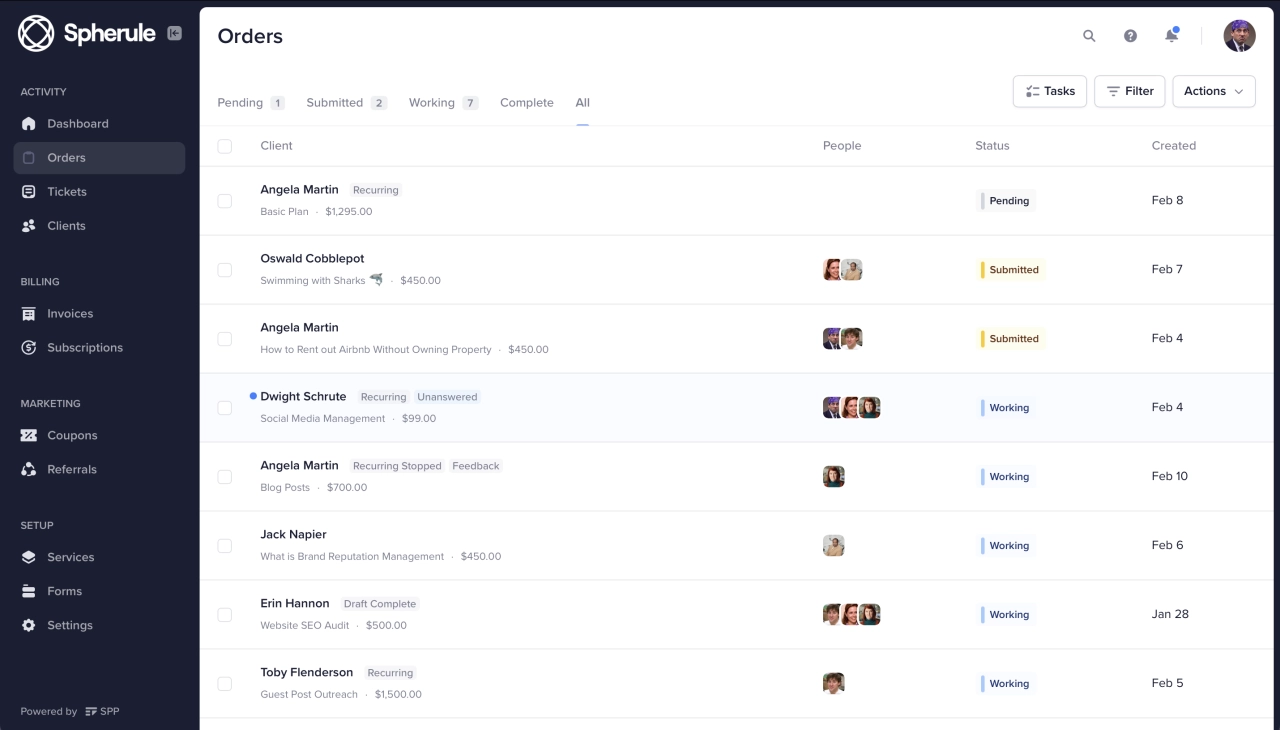

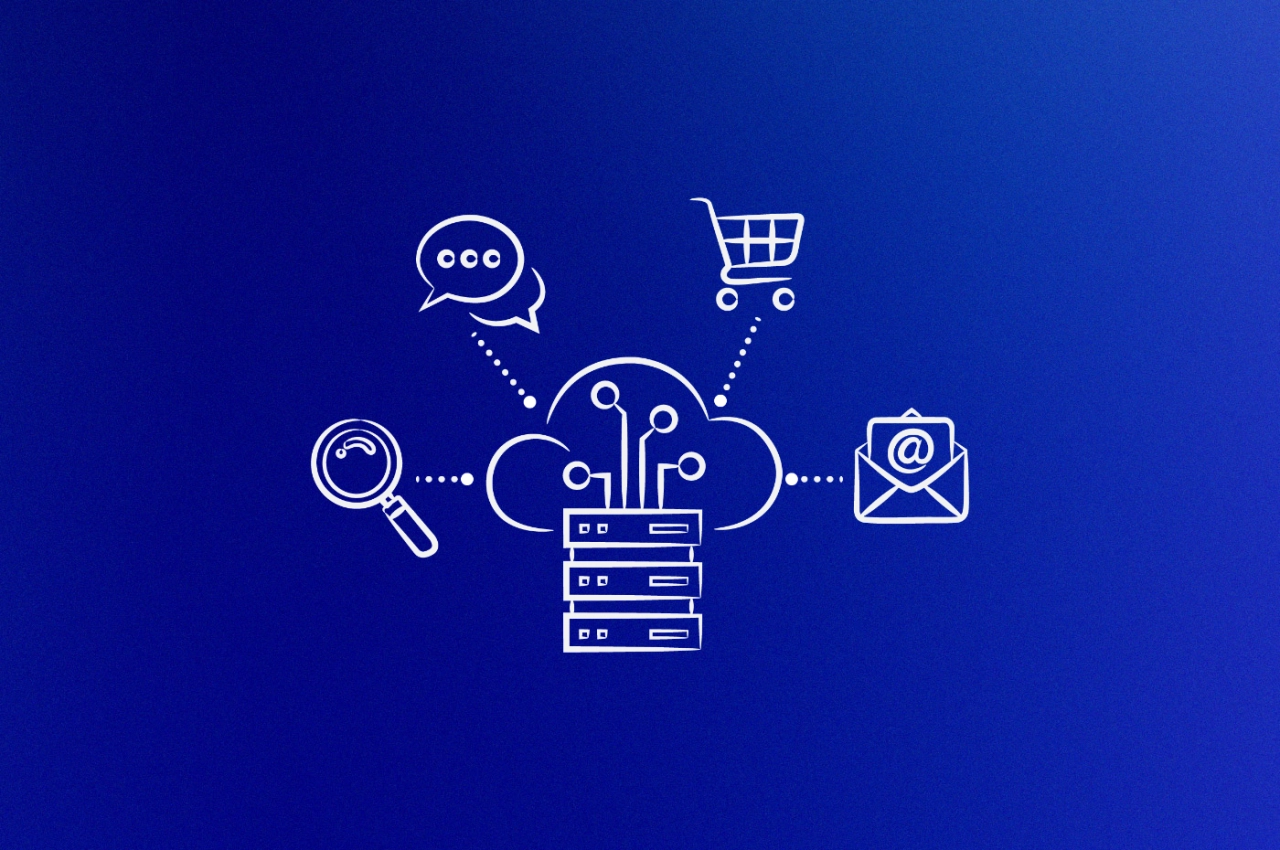

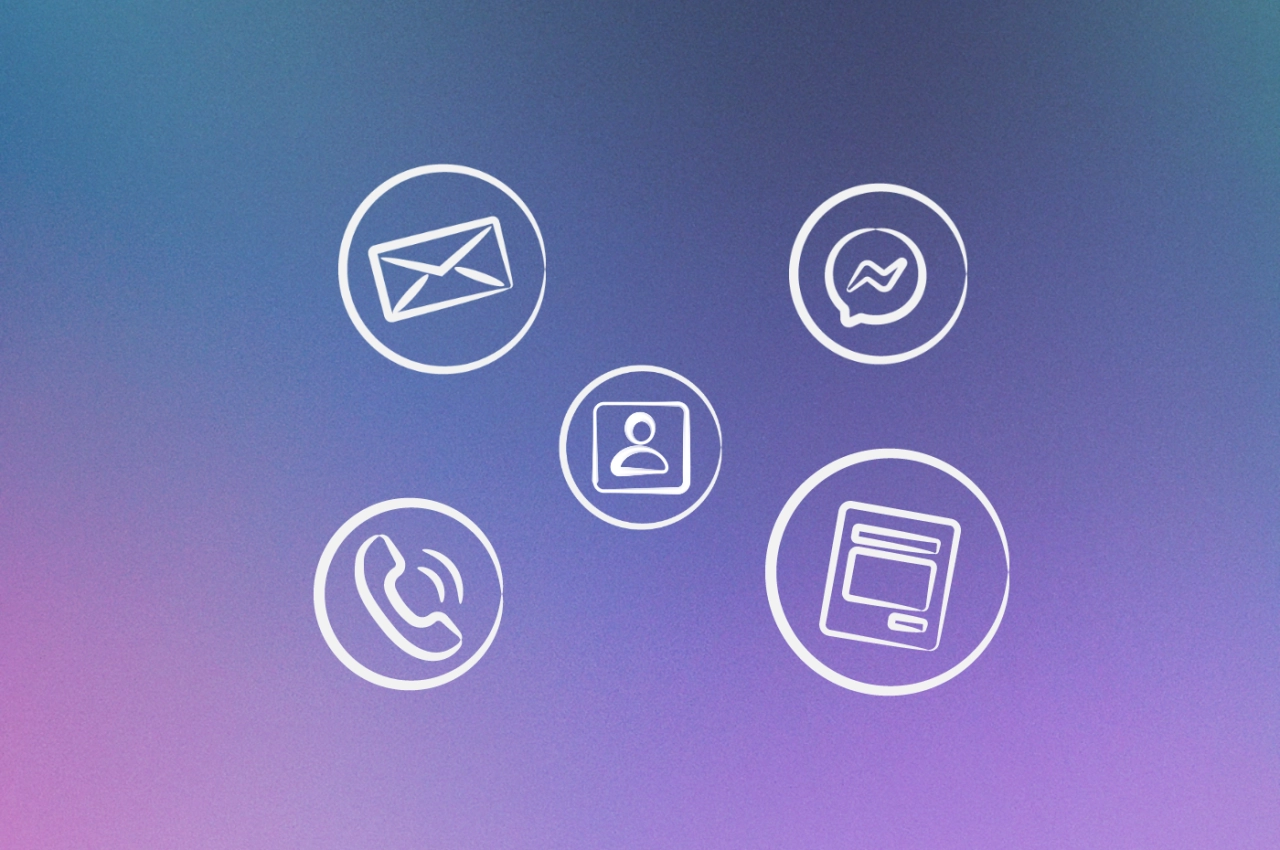
![The Complete Guide to Agency Client Management Software [2025] agency client management software](/img/containers/assets/content/agency-client-management-software.jpg/e56b051e47fdd8f98bdf99db8e673475/agency-client-management-software.webp)


